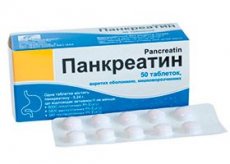Medical expert of the article
New publications
Preparations
Pancreatin
Last reviewed: 03.07.2025

All iLive content is medically reviewed or fact checked to ensure as much factual accuracy as possible.
We have strict sourcing guidelines and only link to reputable media sites, academic research institutions and, whenever possible, medically peer reviewed studies. Note that the numbers in parentheses ([1], [2], etc.) are clickable links to these studies.
If you feel that any of our content is inaccurate, out-of-date, or otherwise questionable, please select it and press Ctrl + Enter.

Pancreatin is a medicinal product that belongs to the group of enzymes, contains a group of enzymes such as protease, amylase and lipase, is able to compensate for the insufficiency of the excretory capacity of the pancreas that occurs in diseases that are accompanied by a violation of the process of secretion of digestive pancreatic juice, and also improves digestive function.
Indications Pancreatin
The enzyme preparation Pancreatin is used for the following disorders:
- EPI – exocrine pancreatic insufficiency (a pathological syndrome that occurs with chronic pancreatitis or cystic fibrosis);
- Chronic sluggish inflammatory-dystrophic processes in the stomach, gall bladder, liver, intestines; conditions that arise as a result of irradiation or removal of the above organs, which are also accompanied by problems with digestion, bloating, diarrhea (with combination treatment);
- Improving the process of food digestion in patients with normal functioning of the gastrointestinal tract, if there are errors in the diet, and in addition, if there are disorders of the chewing function, the patient leads a sedentary lifestyle, with forced prolonged immobilization;
- In preparation for an ultrasound or X-ray examination of the abdominal cavity.
Pharmacodynamics
Pancreatin is an enzyme preparation, it contains excretory pancreatic enzymes: trypsin, lipase, chymotrypsin, alpha-amylase. The preparation breaks down fats, converting them into fatty acids and glycerol; proteins, converting them into amino acids; starch, converting it into dextrins and monosaccharides. In addition, it stabilizes the digestive process. It acts on the body as a painkiller due to trypsin, which suppresses the stimulated secretion of pancreatic juice from the pancreas. The enzymatic activity of the drug reaches its maximum value 30-45 minutes after oral administration of the tablet.
Dosing and administration
The medicine should be taken orally 3-6 times a day before or during meals. The capsules should not be chewed, they are washed down with liquid (fruit juice or water). The dosage is prescribed individually, it depends on the severity of the disease, as well as the age of the patient.
For adults, a single dose is usually prescribed as 2-4 capsules (50-100 U); per day, it is necessary to drink 8-16 capsules (200-400 U).
On average, children are prescribed a single dose of 1 capsule (25 U); age 8-9 years – 1-2 capsules (25-50 U); age 10-14 years – 2 capsules (50 U).
The duration of the treatment course can be several days (if digestive problems arose as a result of an improper diet) or several months and sometimes even years (if the patient requires regular replacement therapy).
Use Pancreatin during pregnancy
There is currently no definitive conclusion regarding the safety of using the drug during pregnancy. Therefore, it is recommended to use it only when the possible benefit of the drug for the woman outweighs the possible risk to her child.
Contraindications
The drug is not recommended for use if the patient has a high sensitivity to the substance pancreatin. It is also contraindicated in acute pancreatitis.
Side effects Pancreatin
When using average medical doses of the drug, side effects occur in less than 1% of cases.
Allergies: sometimes skin rashes may occur.
Metabolic process: If Pancreatin is taken in large doses for a long time, hyperuricosuria may develop. At excessively large doses, the level of uric acid in the blood serum may increase.
Others: use of the drug in high doses in children may cause perianal irritation.
Interactions with other drugs
When combined with antacids containing magnesium hydroxide and/or calcium carbonate, the effectiveness of pancreatin may be reduced.
Taking it simultaneously with acarbose may, in theory, reduce its therapeutic effect.
The simultaneous use of Pancreatin with drugs that improve iron levels in the body may lead to a decrease in iron absorption rates.
Storage conditions
The medicine should be stored in a dry place, protected from sunlight and out of reach of small children. The air temperature should not exceed 25 °C.
 [ 22 ]
[ 22 ]
Attention!
To simplify the perception of information, this instruction for use of the drug "Pancreatin" translated and presented in a special form on the basis of the official instructions for medical use of the drug. Before use read the annotation that came directly to medicines.
Description provided for informational purposes and is not a guide to self-healing. The need for this drug, the purpose of the treatment regimen, methods and dose of the drug is determined solely by the attending physician. Self-medication is dangerous for your health.

